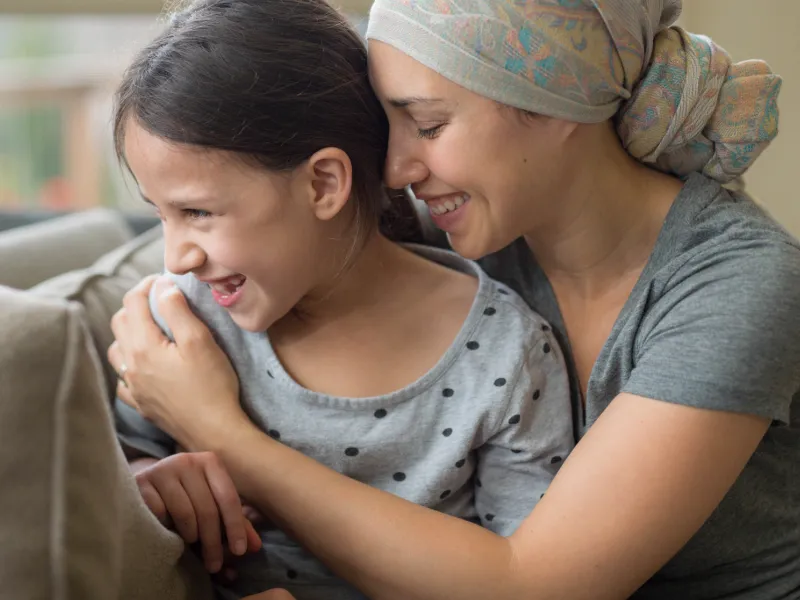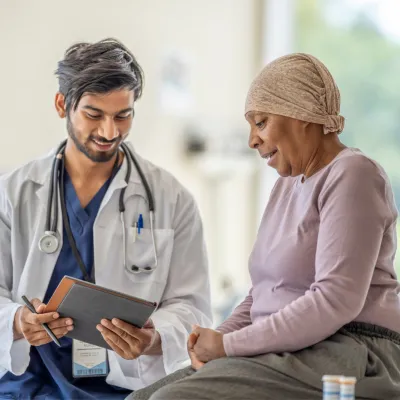
An Expert Partner in Your Cancer Journey
A cancer diagnosis may come as a shock, and you might not know where to begin. But that’s why we’re here. From expert oncologists and clinicians who focus on your medical needs to skilled teams who tend to details, like coordinating appointments, our team strives to inspire hope in every patient we serve. Combining uncommon compassion with the latest in oncology care, we’ll care for you in body, mind and spirit.
We’re here to help you find the right oncologist or a location that’s convenient for you.
Comprehensive Cancer Care That Inspires Hope
At AdventHealth Littleton, our expert team of oncologists and specialists will provide you with compassionate, comprehensive care for your cancer treatment. With access to our ongoing support services like rehab, therapies and support groups, you won’t walk this journey alone. We’re here for you at every step.
- Treatment for a Range of Cancers
-
No matter what specific cancer diagnosis you receive, we’ll get you the resources you need for treatment.
We specialize in a variety of cancer types, including:
- Bladder cancer
- Bone tumors
- Brain tumors
- Breast cancer
- Cervical cancer
- Colon cancer
- Esophageal cancer
- Gynecologic cancer
- Kidney cancer
- Liver cancer
- Lung cancer
- Lymphoma
- Ovarian cancer
- Pancreatic cancer
- Prostate cancer
- Rectal cancer
- Skin cancer
- Understanding Cancer
-
Our experts specialize in knowing the causes of cancer and how to treat it. Understanding cancer, how to reduce your risk and preventing future disease are all part of how we care for your whole health.
Defining Cancer
Cancer starts when abnormal cells grow out of control or lose their ability to die. Cancer can start in almost any organ or tissue, such as the lung, prostate, colon, breast, skin or bones. Once cancer forms, it can get into your bloodstream or lymph vessels and travel to other parts of your body, causing cancerous cells in new locations. This process is called metastasis.
Cancer cells often form tumors, although not all tumors are cancerous. But in some cases, such as leukemia, the cancer cells affect the blood and can circulate through other tissues where they grow.
Types of Cancer
Cancer is the general name for a group of more than 100 diseases. Different types of cancer behave in unique ways. For example, skin and lung cancer grow at very different rates, as do pancreatic and prostate cancer. Your cancer type will determine the kind of treatment you’ll receive.
The three most common cancers in men in the U.S. are:
- Colon cancer
- Lung cancer
- Prostate cancer
The three most common cancers in women in the U.S. are:
- Breast cancer
- Colon cancer
- Lung cancer
Lung cancer is the most common cause of cancer-related deaths in both men and women in the U.S.
Cancer Causes
Many cancer causes are unknown, but some known causes include:
- Genetic conditions
- Excessive alcohol consumption
- Environmental toxins
- Excessive exposure to UV rays
- Obesity
- Radiation
- Tobacco products
- Viruses
- Reducing Cancer Risk
-
According to the American Cancer Society, half of all men and one-third of all women in the U.S. will develop cancer during their lifetimes. Ask your doctor about recommended cancer screenings to help you detect cancer early. Early detection significantly improves outcomes. You also can take control of your health by making healthy lifestyle changes.
To reduce your cancer risk, our experts recommend:
- Getting regular cancer screenings and physical exams
- Discontinuing the use of tobacco products
- A healthy diet with plenty of fruits and vegetables
- Limiting alcohol consumption
- Maintaining a healthy weight
- Protecting your skin from the sun
- Staying physically active
- Understanding your family history and risk factors
Cancer screenings can discover cancer at an early stage, even before symptoms start. When we find cancer early, it’s easier to treat and cure. We also have a better chance of removing it before it spreads to other parts of the body.
We offer screenings for a range of cancers, such as:
- Breast cancer
- Cervical cancer
- Colorectal cancer and polyps
- Endometrial (uterine) cancer
- Prostate cancer
- Skin cancer
- Thyroid cancer
- The Therapies and Treatments You Need
-
We work together as a team — bringing together your surgeon, therapists and other providers to customize a complete cancer treatment plan. After your initial diagnosis, you’ll first meet with your oncologist. They’ll do a physical exam, review your medical history and study any imaging and lab reports.
Your treatment may include a combination of options, such as:
- Chemotherapy: the delivery of cancer-killing drugs through an IV or orally that is usually given in rounds — before or after surgery — with a recovery period in between treatments
- Hormone therapy: medication for treating cancers that rely on hormones to grow by blocking or reducing the hormones your body makes
- Radiation therapy: uses high-powered X-rays, particles or radioactive seeds to damage the DNA of cancer cells, preventing them from growing or multiplying
- Targeted therapies: specific drugs that target the cancer cells, work differently than standard chemo and often have less severe side effects
Along with conventional treatment tools, we also offer complementary therapies. These include nutrition support, mind-body physical therapy, pain management and spiritual support. You may also benefit from chiropractic care, massage therapy or stretching.
- Extra Support When You Need It
-
A cancer diagnosis is a life-changing event for you and your family. Research shows that people who get support have better outcomes.
We offer a wide range of services to help cope with the experience of diagnosis and treatment, including:
- Genetic counseling to promote informed decisions about health
- Individual and family counseling
- Nutrition services, including nutrition counseling and customized nutrition plans
- Oncology Nurse Navigators who guide patients through diagnosis, treatment and survivorship, helping with common barriers and needs
- Palliative care to prevent and relieve pain and stress and provide the best quality of life
- Psychosocial support with a social worker who connects you with support resources and community services, along with counseling
- Weekly and monthly support groups, including the Kids Alive! program which provides support for children who have a parent diagnosed with cancer.
Young Adult Cancer Support Group
Designed for adults ages 45 and younger living with cancer, this group serves younger people in our community as they have unique concerns, questions and needs. Patients in this age group can join our monthly online support group to share their experiences, receive peer support and learn from skilled professionals. To join this group, please complete our online registration form. For additional information, please call our oncology social worker at Call303-765-3814.
- A Devoted Team Just for You
-
You’ll never be alone during your cancer treatment. Our cancer care team includes specialists from different areas who are here to guide you throughout your journey — from diagnosis and treatment to coping with side effects and life after cancer.
Your cancer care team may include the following:
- Breast center managers and Nurse Navigators: work closely with doctors, other medical team members and patients with breast cancer to coordinate their care
- Certified oncology clinical research nurses: full-time research nurses who provide doctors and patients with access to the most innovative cancer clinical trials
- Clinical nurse specialists: oversee patient support services — including individual and family counseling — and lead support groups
- Clinical oncology pharmacists: determine drug doses based on the treatment plan from your provider and offer important pain-management care
- Genetic counselors: work with you and your family to help you understand your inherited cancer risk and ways to be proactive about medical care
- Oncology administrators: work behind the scenes to make sure you have a smooth, well-organized treatment process
- Physical therapists certified in lymphedema therapy: a therapy for breast cancer patients who have swelling and for patients with difficulties moving their upper and lower extremities
- Registered dietitian nutritionists board-certified in oncology nutrition: work closely with patients and their medical team to provide individual nutrition plans during treatment and educate about long-term diet and lifestyle changes
- Speech and swallowing therapists: provide support to patients with head and neck cancers and other digestive tract cancers

Cancer Specialists You Can Count On
We recruit committed providers who are highly skilled, knowledgeable and caring — from surgeons and medical oncologists to specially trained nurses. And with experts like these at your side, you can feel confident that you’re receiving oncology care for your whole-person health.
Compassionate, Expert Cancer Care
If a cancer diagnosis surprises you, rest assured that we’ve spent years preparing to give you the best possible care. Our dedicated team of oncology specialists, advanced technology and support services will help you cope and thrive.

Our Virtual Oncology Integrative Therapy Program
We see the whole you. That’s why our oncology centers in our Colorado network of care offer virtual integrative therapy services to all patients every month — completely free of charge. Patients, survivors, caregivers and community members impacted by cancer are all welcome. Tai chi, meditation, support groups, educational presentations and more will help enhance your whole health — body, mind and spirit.
